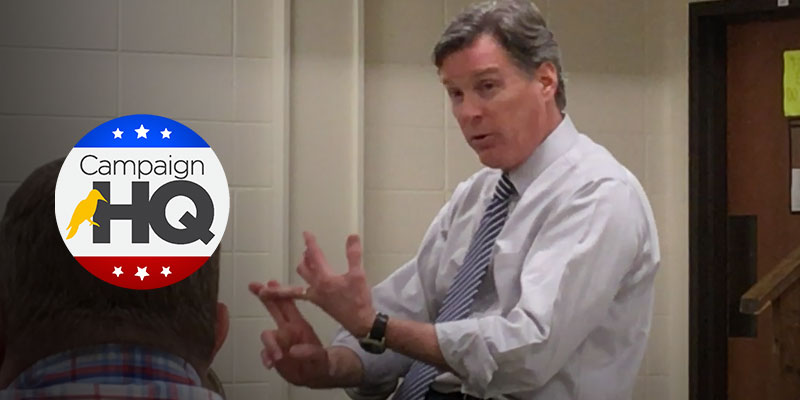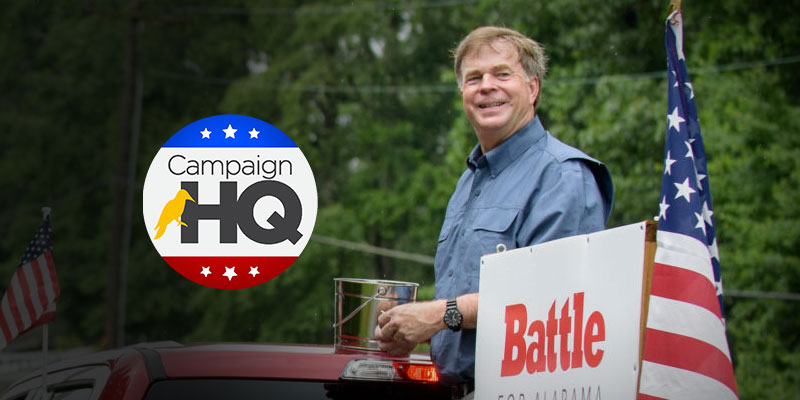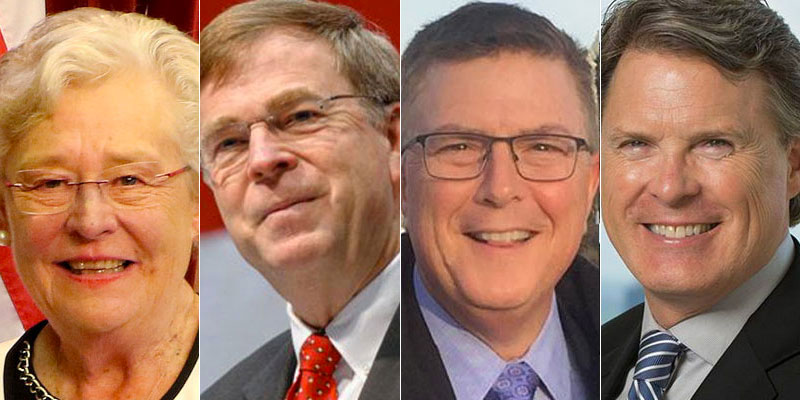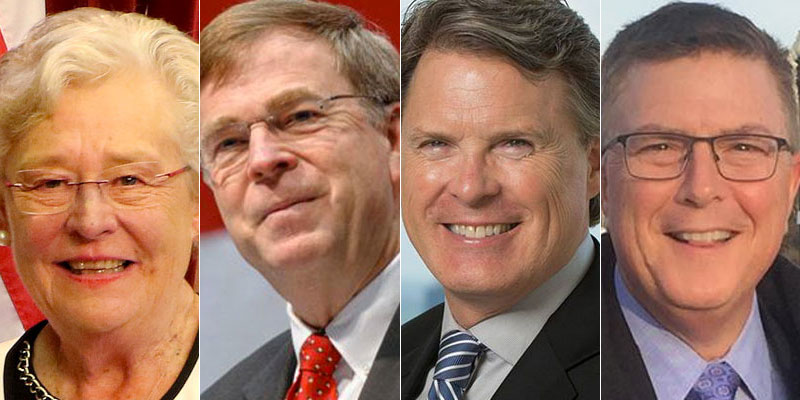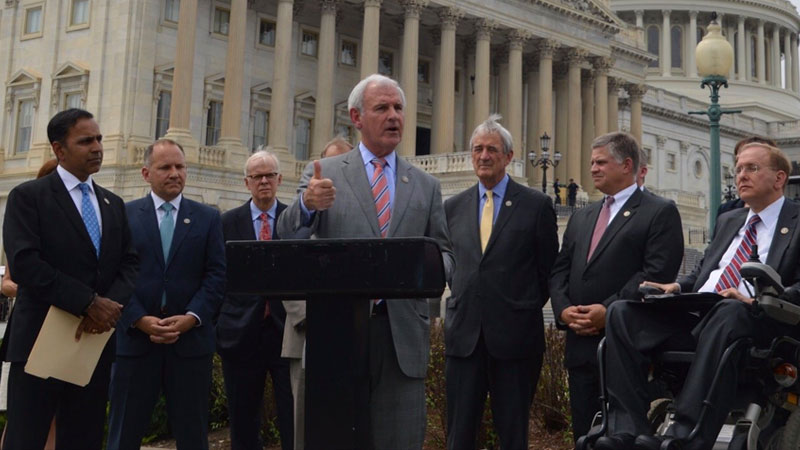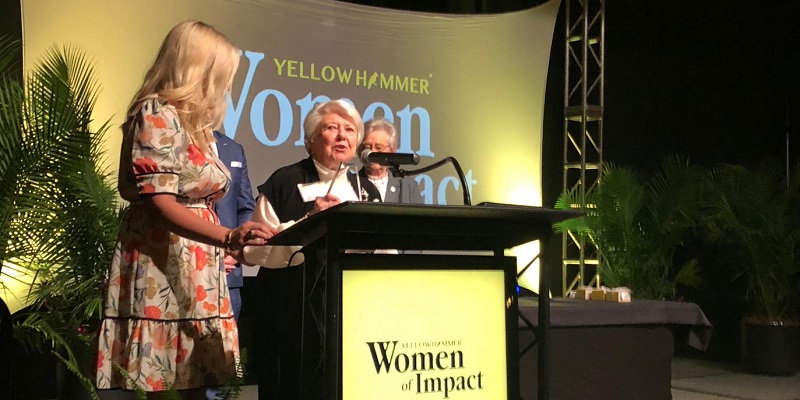MOBILE — As this year’s legislative session winds down, Alabama gubernatorial hopeful State Sen. Bill Hightower (R-Mobile) finds himself juggling the duties of running a statewide campaign and the responsibilities of being an Alabama state senator with the legislature in a rush to adjourn for 2018.
With the June Republican primary around the corner, the father of three and grandfather of three insists he is running as an outsider despite having served as the senator for Alabama State Senate District 35 since 2013.
From a side room at the Whole Foods Market on Airport Boulevard adjacent to his campaign headquarters, Hightower explained to Yellowhammer News his motivations for running, his governing philosophy and how he would change the status quo to make the state of Alabama better.
YHN: Why are you running for governor?
HIGHTOWER: Well, I’ve been a senator for five years – a state senator. And I’ve always been a student of public policy, but when I saw up there the lack of leadership that is occurring in the executive office. And since I work for businesses – I’ve been a businessman, I know when a company that doesn’t have a properly functioning CEO what happens in those companies, and I think that’s the issue that we’ve had. We’ve not had an executive to lead the state. So, I thought I could make a difference in that regard.
YHN: One of the problems with candidates from Mobile is getting the statewide recognition. You’ve always had that with a Huntsville candidate and a Mobile candidate. What are you going to do differently to broaden your presence in the state?
HIGHTOWER: Well, geographic location might be a factor that you look at. You try to correlate on the probabilities. To be honest, there is no magic city in the state, but I am the only southern candidate. So, I’m not fighting – there’s nobody competing for the people down here.
I’ve got a fairly good platform already politically. My dad was a medical doctor here and in Birmingham. And I have a son that lives in Birmingham.
What I like to say that is different is the message that I have. I’m not just talking about what I’m trying to accomplish in the Senate, but what I plan to do as an executive. I have a 12-point plan that I’m calling “Alabama First.” It is on my website at BillHightower.com.
The ideas, the challenge of reform, and also just having a governor that we can point to and say, “That’s a governor,” somebody like a Nikki Haley, or like a Scott Walker. We haven’t had that, and I think we need that in order to recruit businesses and also deal with some of the fundamental issues that we have in Montgomery.
YHN: When it comes to economic development and recruiting of businesses, what ideas do you have that are different that hasn’t been tried yet, or aren’t already in place?
HIGHTOWER: I want to be strategic about our business recruitment. Georgia is not trying to recruit automotive companies because they know the future of the automotive industry is going to be very, very different.
I think we’ve gotten a good automotive base, but with that comes technology now, and we need to focus on that technology. Artificial intelligence is coming at us at a rapid pace. And we have clusters of competence in Huntsville, Birmingham, Tuscaloosa, and you know here in Mobile, other cities. And I want to leverage that.
The business recruitment – I feel like we’ve done pretty good, but we’ve had a dermatologist doing our business recruitment. He doesn’t know much about big business. We’ve had a lawyer before that. What could we do if we had a business guy?
My background is working for Fortune 500 companies, globally. I’ve lived overseas. I’ve lived throughout the United States. Those companies taught me the fundamentals of business – about supply chain, contract negotiation, personnel, leadership, leadership development, organizational development.
These companies have budgets the size of the state of Alabama. They have as many employees as Alabama has. So, big organization and leadership is something I am familiar with, and I know how to go in and turn situations around.
That is competency we haven’t had in Montgomery, and that’s one I want to lend to the state.
So, my familiarity with that whole business development-recruitment process comes from two sides. One side is I’ve been in the big business making decisions about where we’re going to put a plant or where we’re going to move a production line to. I’ve dealt with the international companies.
But the other is I’ve been inside the government and know how it is we incentivize those companies to come. So, I will be the one that protects the Alabama investment from those companies that just want to take everything they can get.
I have asked for the Secretary of Commerce to do a third-party review of their recruitment model to make sure that we are getting a positive return on investment. Sen. Trip Pittman and myself required that a couple of years ago. It is an issue that is close to me because I’ve seen both sides of the issue.
That would be what I would do different. We can recruit any company we want if we give them everything they want. The question is you don’t want to give them everything they want. They’ll take all you have. So, I want to try and do it differently.
Also, we’ve got a new age coming at us. Before we didn’t have jobs and we had people. Now we have jobs, and we don’t have people. I want to focus on certification programs in high schools throughout the state — stop assuming that every student is going to go to college. The certification programs goes beyond shop. It goes into cosmetology and bookkeeping certification, or nurse certification.
We’ve let community college – they used to be trade school. Now they are college prep. And with dual enrollment in high schools, that is college prep. And we don’t really it. There is kind of a redundancy there. I want to cause the junior college system – some are very well run, but when the assets are not well utilized, I want to pull that in and focus it on high school so that when a student graduates, they’ll have a certification that enables them to go get a $35,000-$45,000-a-year job.
That’s going to affect juvenile hall. That’s going to affect truancy. That’s going to affect Medicaid. That’s going to affect prisons. It’s enormous.
In New Mexico, they calculated if they can decrease the dropout rate by 2,500 students in high school, they would save $700 million in their budget. There’s an enormous connectivity in the cost of operating state services when people don’t graduate.
But I think the vocational thing will boost that graduation rate. Some cities are doing it already. But I want to get the visibility throughout the state and try to push it much more.
YHN: When you go to the rural counties around the state, the one complaint they sometimes have is the attention tends to be given to Huntsville and Mobile with economic growth, and they feel left out of the mix. This goes back a little to the skills part of the last question, but how do you make these other places around the state a more viable option for business looking to locate in Alabama?
HIGHTOWER: Infrastructure, and what I mean by that is roads, bridges, waterways and Internet connectivity, and improving that because I have a business that I know of in Alabama right now that wants to locate in a rural county that does not have Internet connectivity, and therefore cannot. I want to do that.
Go back to education – right now at Murphy High School, a midtown school here, the students are taking live University of Alabama courses and interacting with a professor there in Tuscaloosa. That’s incredible because we can take that broadband connectivity and we can take our best teachers and run them in schools in rural areas and change the cost model and availability of coursework.
I think the Columbia [Southern University] over in Baldwin County, it is one of the largest Internet schools in the states. You can take Harvard and Yale courses online right now. Why can’t we do high schools?
You can be remote. Outside of Birmingham, there’s a school system that has a virtual school platform, and they’re making money. A public school is making money by enabling students who can’t access the school, whether they’re handicapped or unable or special needs. They can take high school courses at home online.
So, with that Internet connectivity, you can change the education model in the rural areas. If you change the education model, I think you can have a workforce that is more prepared.
You know, I’m not talking about a three-month program here. I think one of the biggest things that we’ve done is we’ve talked in terms of a year or two. But I’m going to try to put the building blocks in place for the next 40 years. I don’t want to just think about a decade. I want to take it by the century.
That’s where artificial intelligence and, I think the expansion of STEM programs in high schools is so critical. The automotive industry, as for instance – driverless cars, fractional ownership, lighter cars, battery-powered cars.
I mean, I think in some places, I would be selling my dealership right now if I were a car dealer owner because it’s going to shift radically.
That’s some of what I would do, but I also want to leverage the strengths of each of the regions because we need to pick a few, not everything – pick a few industries that are very conducive to certain regions in the state, and then we can focus on those industries.
If everything is your priority, then nothing is your priority. So, we’re going to have to pick.
YHN: When you talk about infrastructure, people of think of roads and bridges. Do you have a punch list of projects in mind?
HIGHTOWER: Well, what I want to do is right now, the governor politicizes roadbuilding and shifts the spin around to get legislators’ votes. I want to develop a road, bridge and waterway commission. Might even make it broadband.
See, we’re thinking about roads and bridges. That is what everybody is thinking. But tomorrow is broadband.
And we have the fourth-most navigable waters in the nation. So, waterway maintenance is huge.
What I want to do is put a commission together like Tennessee, like Georgia – that not only develops a 10-year plan, but sticks to it, and therefore take the politicization of the roadbuilding process out.
So then I do two things – I get a long-term view instead of a short-term view. I think everybody agrees to the benefit of that. But I also benefit my road and bridge builders, and waterway maintenance and broadband because they’ll be able to maintain a workforce, and not be jerked off-and-on, left-and-right and north-and-south, and have more of a steady volume. I want to maintain our road and bridge building capacity here in Alabama. We’ve lost maybe 10 bridge builders since 2008.
I don’t want to rely on bridge builders outside the state. I want to have that capability inside the state.
[…]
YHN: Tell us about how you would fund infrastructure.
HIGHTOWER: I think also you know, one of the things I wanted to initiate and that is the sell-lease back.
We own a lot of real estate, a lot of buildings in this state. If we don’t have a five-year purpose for that – if we can’t identify a purpose within five years, we have to sell that land. I pushed some legislation this session that said if you didn’t have a strategic purpose, you had to sell it. That money would then come into a central depository. I want to use that in order to build infrastructure projects and leverage for specific capital purchase projects.
That involves privatizing the DOT. Texas has a budget 10 times our size, Alabama’s size — yet they only have 50 percent more people to execute that budget.
So, I want to outsource as much government where it makes sense.
YHN: Privatizing the DOT – that would probably raise a lot of eyebrows. How would you do that?
HIGHTOWER: I know it can be done. Look at the Texas numbers. We can outsource more of the planning. And when you talk to county commissions, they feel like the Alabama DOT raises their costs by making them over-engineer projects.
But we have a lot of lands and buildings we can sell off if we don’t have a specific purpose for. That would definitely be one of the focus areas. We’ll take that savings and redeploy it in our infrastructure projects. That’s the whole idea. […]
YHN: When you talk about waterways – that seems to be sort of an antiquated means of transit. Talk a little about that as a priority.
HIGHTOWER: We’re moving into a new era with the expansion of the Panama Canal. Now we have post-Panamax vessels, and they have deeper drafts and wider berths. And I’ve gone to the Panama Canal and have seen these ships. They’re amazing.
So that brings a whole other realm of cargo and capability into the state, and our waterways go up through the state. So this isn’t just a coastal issue. This is an Alabama-wide issue. We ship automobile steel. We ship copper. We ship coal. We ship scrap – just enormous amounts through our waterways.
It’s not just for tourism that we have waterways. But it is a tremendous industrial boon to our state as well, and it does reach all the way to Huntsville. It is not just a coastal phenomenon, but it is one that FEMA is increasingly unable to fund.
I think one of the things I want to bring to the state is a focus on making the easy-to business and always have continuous improvement in mind. I am from manufacturing. We have the phrase “continuous improvement, best in class.” And I’m always looking for those to implement.
So, making it easy – but also, the element of tax reform. Thirty states around the nation have revised their taxes, and that’s why for three years, I have tried to implement the flat tax in Montgomery.
My first rendition would take the 5 percent tax rate down to 2.6 percent. It would be revenue-neutral and eliminate the need to file the Alabama state return. I think it would unleash a tremendous amount of economic upside for the state.
But what I’ve found is the Montgomery interests put it down. They won’t let change come.
I’ve also focused on trying to eliminate waste and fraud, and also improve educational funding by addressing the fact that we have the most earmarked budget in the nation at 93 percent. We go every year over the decision to spend 7 percent of the state’s budget, and no state is looking at us as a poster child on how to do it.
So, I introduced a bill that would from here on out if ever you earmark something, or you get a credit exemption or deduction, after seven years it would have to fall off. It wasn’t in perpetuity.
The difficult aspect of how earmarking is that it was done in 1940 and our priorities have changed significantly. We can’t change anything. So, I’ve tried to implement budget reform so that we could have … more dollars in education.
Now I think, part of that … immovability of the Montgomery scene has something to do with term limits. And that’s why I introduced and carried to the Senate floor a term limit that would limit everyone’s service to three consecutive terms or 12 years.
Now what was amazing about that is that a month ago, the Senate and the House passed a joint resolution calling on Congress to introduce term limits in Washington, D.C., part of the Article 5 convention.
So I said if they want term limits in D.C., they ought to have them in Montgomery. So, I submitted a bill to do it, and they killed it. I had nine colleagues stand with me on this.
That was an effort to try to change the landscape. If I did that, then I could get people that hadn’t been there, part of the system – going out to dinner every night with the lobbyists and looking to the lobbyists for the funding and everything – I could change that mentality somewhat, not radically.
Once more about the term limit thing, you know it is a constitutional amendment, so people have to vote on it. Our polling shows 84 percent of the public want term limits – just the fact, they won’t even let it come up for a vote for the public.
YHN: The stranglehold in Montgomery – what else besides term limits would change that culture? It seems like every decade or so, you have some big political shift, and they say, “We’re going to clean up the corruption in Montgomery.” But they have been saying that for a hundred years.
HIGHTOWER: We’ve had some bumps for sure, and I’m not proud of it. I am tired of people outside of Alabama laughing at us. We’ve got a horrible reputation outside of Alabama in some circles.
But we know how Alabama is. We like it here. It’s a great place to live. We got some incredible businesses and incredible people here. I think businesspeople running is a big help. And, I think you’re not going to get any change in Montgomery with people that have worked there for 20 and 30 years are in office. You’re not going to get the reforms that people want.
And that’s what I want — that’s part of my message is I don’t want to maintain. I want to reform. My reforms will be focused on – this may be simple to say, but children. If my focus is on children, I’ll focus on education. I’ll focus on business. And I’ll focus on the future if that is the core issue.
We’ve gotten alternative education possibilities for students now, which I think has helped the low-income tremendously.
Having somebody that has business acumen talk about where you’re going to develop a strategy – when I went to the Senate, I asked the Senate leadership, “What’s the three-year plan here?” They said, “We don’t have a plan for next week. What do you mean a three-year plan?”
So, I want to have a longer-range plan, and I want to work with the legislature on trying to execute that plan. Governor Bentley never came over to the legislature and said, “Guys, let’s pull together, we need to get this done.”
It’s my understanding Bob Riley did. Bentley never did it, and I think that was not the way to operate. You’ve got to lead by example, and you have got to try to serve people.
YHN: The current governor now – what would you do differently from what she has done during her first year or so in office?
HIGHTOWER: I think she took over at a difficult time. And many people are grateful for it. I know Kay Ivey. And I was in the race four months before she ever was. And I determined when she announced after I had been in it four months that Alabama still needs somebody that is a businessperson in order to bring kind of a new level of professionalism and visibility to the state.
I hope it is me, but if it is not me, we need to have a governor that we can be proud of, somebody that can run the right start for four years to really make the changes that we need in Montgomery.
YHN: Social issues – talk about your positions on marriage, abortion, your view of the separation of church and state.
HIGHTOWER: Everybody else can talk about their position on it, but I’m the only one you can actually go and see my record.
Look up my bills. You know, I passed a bill to make it illegal to sell baby body parts. I’ve supported every piece of pro-life legislation, not because it is fashionable. My wife and I have worked in the pro-life movement ever since we were married.
I also want to make adoption easy and at a lower cost for people. We have got to do it right. We have got to make it easy because we have more and more, quote, unquote “orphans” in our society. And the state government can’t take care of that. The community has to help us.
YHN: We’ll wrap it up on this – give me a closing sale’s pitch if you were standing before voters on election eve.
HIGHTOWER: There are four things that I like to point out – my business background. There’s no other candidate – these companies I’ve worked for, they have budgets the size of Alabama. And I’ve had corporate leadership in that. That’s important because they’ve taught me how to turn tough situations around. That is what I want to do in Montgomery.
Two is I am an outsider. People say, “Well wait a minute. You’re a senator.” I am, but when I ran for the Senate, Montgomery spent a million dollars to defeat me. The other candidate was a long-termer, and I spent $100,000, and I beat him. And Montgomery was shocked when somebody they didn’t pick won.
And I’ve remained outside the bubble. I’ve voted against every tax increase that has been proposed – primarily because I want reform before I want revenue. Until we fix our budgetary problem, why add money? It just perpetuates the same problem.
Montgomery has a history of transferring money out of education to other programs. So, we’re already taking from education when education needs more dollars. They need more resources, not less.
[…]
The third is I am conservative. I am not a conservative because it is stylish. I’ve been that way ever since college. I read von Mises, and Hayek, and Friedman – conservative economics. I like that stuff.
But we also know it works. Rudy Giuliani implemented a conservative agenda in New York. He turned New York around. Rick Perry – Texas has been amazing economically.
I’ve been voted consistently in the top three conservatives in the Senate every year I have been there. But look, I don’t want to just be – I tell everybody first I’m a conservative, and second a Republican. I call myself a Bill Hightower Republican because I’m going to vote on what’s right. I’m going to do what’s right.
The Republican Party is something I’ve been a part of. I’m on the county executive committee. I’m on the state executive committee in the Republican Party. But I’m looking for solutions that work, and that’s what I’m going to aim at. So, that’s the conservative, but the record part – the one you can see.
The last thing I want you to walk away with is the leadership. A lot of people in the race are talking about what they have done. I’m going to talk about what I’m going to do. And I’ve got a 12-point plan that I’ve published and made public for everybody.
My biggest concern in this particular race is that people are not going to have the opportunity to vet all of the candidates properly. We need to have debates. We need to get out, all of us so that everybody in Alabama knows the vast bench strength that is being offered here. When a candidate isn’t there, there is not an appropriate vetting procedure. That’s a big concern of mine in this particular race.
YHN: I asked you early about being the “Mobile” candidate. What have you done making the rounds around the state?
HIGHTOWER: I think we put 20,000 miles in four months on the car. My wife and I have driven all throughout the state visiting everybody that will meet with me. But also strategically, people that I know have the values that I have would see me as a valuable candidate – businesspeople, a lot of businesspeople.
As I’ve worked overseas, I’ve done missions work at the same time. And that’s enabled me to be in touch with many, many faith-based organizations throughout the state. But also, I teach at a Christian camp and things like this.
So you know, those relationships have been there long before I ran for office. I’m with Outback America. Outback America does camps out in West Mobile, Tuscaloosa, Huntsville. I helped carry that camp out to Poland and to Ukraine. There’s a lot of people in Birmingham and Tuscaloosa that are working with me on that.
Now as far as penetrating it more, [Monday] my commercial hits the airwaves and in that commercial, you’ll see that I talk the whole time. I don’t have a narrator. That’s on purpose. And I touch on the points that I’ve worked on ever since I’ve been in the Senate.
You know, I didn’t bring up these issues like term limits, budget reform, tax reform just this year. I’ve been doing this ever since I’ve been up in the Senate. I certainly don’t want it to be perceived as this is just coming out in the last year. I’ve enjoyed working in the Senate, and I was about to go back into private work and bring that to a close because I never felt I wanted it to be a career. I want to serve and get out like the Founding Fathers did.
But when I looked over across the road … the casual observer – they saw it in newspapers and tweets or Yellowhammer – I saw it up close. I said this is just bad, bad leadership. And I thought I could do better. And that’s when I decided I would offer myself up for this. I don’t have a big group behind me. The incumbent is not really incumbent. She wasn’t elected in.
My fear is Alabama is going to accept something average when they can have something exceptional.
@Jeff_Poor is a graduate of Auburn University and is the editor of Breitbart TV.
[Editor’s note: Some changes were made for clarity. The mention of Columbia Southern University was changed for specificity. The earlier use of “post-Panama” was changed to post-Panamax due to a transcription error.
Also, an earlier version left out a key qualifier on Hightower’s position on the buying and selling of baby body parts. The initial version said I passed a bill to sell baby body parts, that should have included “to make it illegal.”]




